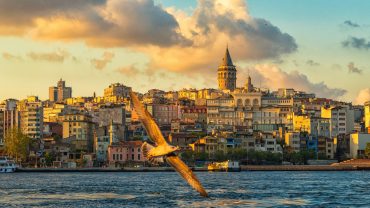Alternative Titles: Tʿbilisi, Tiflis
Tbilisi, formerly
Tiflis, capital of the republic of
Georgia, on the Mtkvari (
Kura) River at its dissection of the Trialeti (Trialetsky) and Kartli (Kartliysky, or Kartalinian) ranges. Founded in 458 (in some sources, 455), when the capital of the Georgian kingdom was transferred there from
Mtskheta, the city had a strategic position, controlling the route between western and eastern
Transcaucasia. It was often captured and sacked and knew many masters: the Persians in the 6th century, the
Byzantine Empire and the Arabs in the 7th. In 1122
David IV (the Builder) of Georgia captured Tbilisi and restored it as a capital, but in 1234 it fell to the Mongols, and in 1386 it was sacked by Timur. The Turks captured the city on several occasions, and in 1795 it was burned to the ground by the Persians. In 1801 Tbilisi was captured by the Russians, who improved its communications by building the Georgian Military Highway across the
Greater Caucasus from Vladikavkaz to Tbilisi. In 1872 it was linked by rail to
Poti on the
Black Sea and in 1883 to
Baku on the
Caspian Sea. In 1921 it was made capital of the Georgian republic.Modern Tbilisi is an attractive city: the
Mtkvari, bordered on the right bank by a boulevard, lies partly in a steep gorge and is made broader by the Ortachalskaya hydroelectric plant in the city. Beside the river, the old town, with narrow, winding streets, is dominated by the ruins of the old fortress and the huge, symbolic figure of Georgia on a ridge above it. In the old town are the Sioni Cathedral, dating from the 5th century and often reconstructed, the Metekhi Palace of the Georgian kings, and the 6th-century Anchikhati Church. Newer parts of the city lie beneath Mount Mtatsminda, accessible by a funicular rail line. North of the city is a large reservoir fed by irrigation canals.Tbilisi is a major cultural and educational centre, with a university, several other institutions of
higher education, and more than 100 research establishments. The city is a principal industrial centre of the region. Its engineering services are important in the production of electric locomotives, machine tools, agricultural machinery, and electrical equipment and in the repair of locomotives and rolling stock. Other industries make textiles; leather goods and footwear; furniture; beer, wine, and spirits; and a range of foodstuffs. In 1966 an
underground railway was opened in Tbilisi.
Tbilisi Georgian: თბილისი in some countries also still known by its pre-1936 international designation, Tiflis, is the capital and the largest city of Georgia, lying on the banks of the Kura River with a population of approximately 1.5 million people. Tbilisi was founded in the 5th century AD by Vakhtang I of Iberia, and since then has served as the capital of various Georgian kingdoms and republics. Between 1801 and 1917, then part of the Russian Empire, Tbilisi was the seat of the Imperial Viceroy, governing both Southern and Northern Caucasus. Because of its location on the crossroads between Europe and Asia, and its proximity to the lucrative Silk Road, throughout history Tbilisi was a point of contention among various global powers. The city’s location to this day ensures its position as an important transit route for various energy and trade projects. Tbilisi’s diverse history is reflected in its architecture, which is a mix of medieval, neoclassical, Beaux Arts, Art Nouveau, Stalinist and the Modern structures. Historically, Tbilisi has been home to people of multiple cultural, ethnic, and religious backgrounds, though it is currently overwhelmingly Eastern Orthodox Christian. Its notable tourist destinations include cathedrals Sameba and Sioni, Freedom Square, Rustaveli Avenue and Agmashenebeli Avenue, medieval Narikala Fortress, the pseudo-Moorish Opera Theater, and the Georgian National Museum.
You need a valid passport or ID card to enter
Georgia. Only
Republic of Abkhazia and
Republic South Ossetia need seperate visas. Fifthy
country citizens may enter and stay in Georgia without a visa for up to 365 days. Visit the Embassy of Georgia’s website for the most current visa information.





Comment (0)